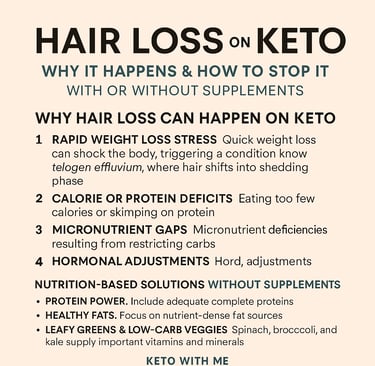Hair Loss on Keto: Causes, Prevention, and Top Tips to Regrow Naturally (With or Without Supplements)
Discover why hair loss can occur on a keto diet and learn how to prevent it with nutrient-rich foods, lifestyle tips, and optional vitamin supplements for healthy, natural hair regrowth.
INFO AND TIPSBLOG
9/30/20252 min read


Hair Loss on Keto: Why It Happens & How to Stop It (With or Without Supplements)
Many people start a ketogenic lifestyle and enjoy amazing benefits like steady energy, fat loss, and fewer cravings. But after a few months, some notice an unwelcome surprise: increased hair shedding.
Don’t panic! Hair loss on keto is usually temporary and reversible. Let’s explore why it happens and how to combat it—both with and without vitamin supplements.
Why Hair Loss Can Happen on Keto
Rapid Weight Loss Stress
Quick weight loss can shock the body, triggering a condition called telogen effluvium, where hair shifts into a shedding phase.Calorie or Protein Deficits
Eating too few calories or skimping on protein can deprive hair follicles of the building blocks they need.Micronutrient Gaps
Restricting carbs sometimes means missing vitamins and minerals (like biotin, zinc, or B-vitamins) that support hair growth.Hormonal Adjustments
As your body adapts to fat-burning, hormones like cortisol and thyroid hormones can fluctuate temporarily, influencing hair cycles.
Nutrition-Based Solutions Without Supplements
Focus on real, nutrient-dense foods to feed your hair:
Protein Power: Include adequate complete proteins—think eggs, salmon, beef, or tofu—to provide essential amino acids.
Healthy Fats: Avocado, olive oil, and fatty fish keep your scalp moisturized and inflammation low.
Leafy Greens & Low-Carb Veggies: Spinach, broccoli, and kale supply folate, iron, and vitamin C.
Nuts & Seeds: Almonds, chia seeds, and walnuts deliver zinc and selenium.
Pro Tip: Track macros to ensure you’re getting at least 0.8–1.0 g of protein per pound of lean body mass.
Lifestyle Tips to Reduce Shedding
Manage Stress: Incorporate gentle movement like stretching, or walking to keep cortisol in check.
Get Enough Sleep: Aim for 7–9 hours to allow hormone balance and hair growth cycles to normalize.
Avoid Harsh Styling: Reduce heat, tight hairstyles, and chemical treatments while regrowth catches up.
When Keto-Friendly Supplements Can Help
If your diet alone isn’t filling the gaps, consider these keto-approved options:
Biotin (Vitamin B7): Supports keratin production.
Collagen Peptides: Provide amino acids for hair and skin.
Zinc & Iron: Vital for follicle health (but check labs first).
Electrolytes with Magnesium: Prevent general fatigue and support cellular function.
Want a Keto Supplement to support you in your keto journey? These GLP-1 Supporting Keto Vitamins are perfect!
Always consult a healthcare provider or dietitian before starting new supplements—especially if you have thyroid or hormonal concerns.
How to Support Hair Growth Even Off Keto
Maybe you’ve decided keto isn’t for you. These hair-friendly habits apply to any eating style:
Eat a balanced diet rich in protein and whole foods.
Limit processed sugars that can trigger inflammation.
Continue stress management, scalp massage, and gentle hair care.
The Bottom Line
Hair loss on keto is usually a temporary side effect of rapid change, not a permanent problem.
By nourishing your body with adequate calories, high-quality protein, and micronutrients—and considering targeted supplements if needed—you can keep your locks healthy while enjoying the benefits of a low-carb lifestyle.
Need some recipes to get you on track with your nutrition goals? We have plenty! Start here : KETO RECIPES




Explore delicious keto recipes and diet tips.
Diet
Disclaimer: Keto With Me participates in the Amazon Services LLC Associates Program, an affiliate advertising program designed to provide a means for sites to earn advertising fees by advertising and linking to Amazon.com.
ketowithme@ketowithme.net
© 2025. All rights reserved.
Health
